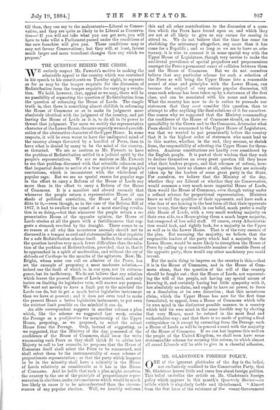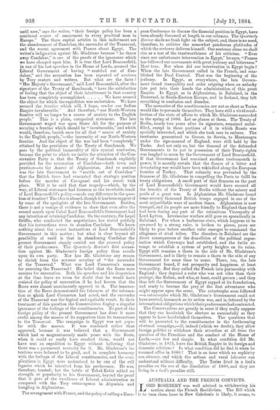MR. GLADSTONE'S FOREIGN POLICY.
ONE of the ignorant platitudes of the day is the belief, not exclusively confined to the Conservative Party, that Mr. Gladstone knows little and cares less about foreign politics. This belief underlies the article on Mr. Gladstone's foreign policy which appears in this month's Quarterly Review—an
article which is singularly feeble and ill-informed. Almost from the first hour of the existence of the resent Government until now," says the writer, " their foreign policy has been a continual source of amazement to every practical man in Europe." The three capital articles in this indictment are the abandonment of Candahar, the surrender of the Transvaal, and the recent agreement with France about Egypt. The writer's indignation against Mr. Gladstone because " he threw away Candahar," is one of the proofs of the ignorance which we have charged upon him. It is true that Lord Beaconsfield, in one of his last speeches in the House of Lords, accused the Liberal Government of having " scuttled out of Can- dahar," and the accusation has been repeated ad nauseam by Tory orators and writers. But what are the facts ? "Her Majesty's Government," said Lord Beaconsfield, after the signature of the Treaty of Gundamak, " have the satisfaction of feeling that the object of their interference in that country
has been completely accomplished We have secured the object for which the expedition was undertaken. We have secured the frontier which will. I hope, render our Indian Empire invulnerable." And therefore, " our North-Western frontier will no longer be a source of anxiety to the English people." This is a plain, categorical statement. The late Government waged war upon Shere Ali for the purpose of securing a frontier which should be " invulnerable," and which would, therefore, banish once for all that " source of anxiety to the English people,"—the insecurity of our North-Western frontier. And the object of the war had been " completely " attained by the provisions of the Treaty of Gundamak. We pass by the political immorality of this cynical confession, because the point to which we invite the attention of the Con- servative Party is that the Treaty of Gundamak explicitly provided for the restoration of Candahar—both town and province—to the Ameer of Afghanistan. And so anxious was the late Government to " scuttle out of Candahar " that the British force had evacuated that, strategic position before the murder of Cavagnari and his escort took
place. Will it be said that that tragedy—which, by the way, all Liberal statesmen had foreseen as the inevitable result of Lord Beaconsfield's policy—made any difference in the ques- tion of frontier? The idea is absurd, though it has been suggested by some of the apologists of the late Government. Besides, there is not a vestige of evidence to show that even after the second march upon Cabul Lord Beaconsfield's Government had any intention of retaining Candahar. On the contrary, Sir Lepel Griffin, who conducted the negotiations, has stated publicly that his instructions were to abandon Candahar. We know nothing about the secret instructions of Lord Beaconsfield's Government in this matter ; but what is clear beyond all possibility of cavil is that in abandoning Candahar the present Government simply carried out the avowed policy of their predecessors. The Quarterly Review's first accusa- tion against Mr. Gladstone's foreign policy thus recoils upon its own party. Nor has Mr. Gladstone any reason to shrink from the severest scrutiny of " the surrender of the Transvaal." What was Lord Carnarvon's reason for annexing the Transvaal ? His belief that the Boers were anxious for annexation. Both his speeches and his despatches at the time leave no room for doubt that he would have resisted the policy of annexation if he had known that the Boers were almost unanimously opposed to it. The insurrec- tion of the Boers demonstrated the falseness of the informa- tion on vi.hich Lord Carnarvon had acted, and the surrender of the Transvaal was the logical and equitable result. In their treatment of this question the Conservatives display a singular ignorance of the feelings of the constituencies. No part of the foreign policy of the present Government has done it more credit among the masses of its supporters than its transactions in the Transvaal. The campaign in Egypt was not popu- lar with the masses. It was condoned rather than approved, because it was believed that a. Government which had so magnanimously made peace with the Boers, when it could so easily have crushed them, would not have sent an expedition to Egypt without believing that there was a paramount necessity for it. Mr. Gladstone's in- tentions were believed to be good, and in complete harmony with the feelings of the Liberal constituencies, and the com-
plications in Egypt were understood to be one of the evil legacies which he inherited from his predecessor. He was,
therefore, trusted ; but the battle of Tel-el-liebir added no strength or popularity to his Government, beyond the proof that it gave of the excellence of Liberal administration as compared with the Tory extravagance in Abyssinia and bungling in Afghanistan.
The arrangement with France, and the policy of calling a Euro-
pean Conference to discuss the financial position in Egypt, have been already discussed at length in our columns. The Quarterly Review sheds no fresh light on the subject, and. there is no need, therefore, to criticise the somewhat ponderous platitudes of which the reviewer delivers himself. One sentence alone we shall cite as a test of the trustworthiness of his criticism. " Ever since our unfortunate intervention in Egypt," he says, "France has followed our movements with great jealousy and bitterness." Most true. But when did our intervention in Egypt begin When the late Government called in the French, and esta- blished the Dual Control. That was the beginning of the jealousy. In Egypt, as everywhere, the late Govern- ment found tranquillity and order reigning when an unlucky fate put into their hands the administration of this great Empire. In Egypt, as in Afghanistan, in Zululand, in the Transvaal, in South-Eastern Europe, and in Ireland, they left everything in confusion and disorder.
The memories of the constituencies are not so short as Tories would like to persuade themselves. They have still a vivid recol- lection of the state of affairs to which Mr. Gladstone succeeded in the spring of 1880. Let us glance at them. The Treaty of Berlin, nearly two years after its signature, remained unful- filled, except in those portions of it in which Russia was specially interested, and which she took care to enforce. The territories guaranteed to Greece, to Servia, to Montenegro under the sign-manual of England, were still held by the Turks. And not only so, but the demand of the defrauded Governments to be put in possession of their Treaty-rights was laughed to scorn by the Government of Lord Beaconsfield. If that Government had remained another twelvemonth in power, it is morally certain that the flames of a bitter and devastating war would have been rekindled along the European frontier of Turkey. That calamity was prevented by the firmness of Mr. Gladstone in compellino. the Porte to fulfil its treaty obligations. A small part of that firmness on the part of Lord Beaconsfield's Government would have secured all the benefits of the Treaty of Berlin without the misery and perils of a great war. In Afghanistan Mr. Gladstone found some seventy thousand British troops engaged in one of the most unjustifiable wars of modern times. Afghanistan is now tranquil, and its people are more friendly to England than they had been during any part of the calamitous Viceroyalty of Lord Lytton. Internecine warfare still goes on sporadically in Zululand. For when a barbarous state, which happens to be governed by a strong ruler, is broken to pieces, years are likely to pass before another ruler emerges to command the allegiance of rival tribes. The disorders in Zululand are the direct consequences of the demolition of the political organ- isation which Cetewayo had established, and the futile at- tempt to establish a system of petty knights on its ruins. Egypt still remains a thorn in the side of Mr. Gladstone's Government. and is likely to remain a thorn in the side of any Government for some time to come. There, too, the late Government found, if not prosperity and happiness, at least tranquillity. But they called the French into partnership with England ; they deposed a ruler who was not viler than their prot6ge, the Sultan, and who, at least, could govern ; and they thus left the Government of Egypt sapped at its foundations, and ready to become the prey of the first adventurer who might appear upon the scene. The catastrophe soon followed —a catastrophe which Mr. Gladstone's Government could not have averted, inasmuch as its action was, and is, fettered by the international obligations which their predecessors had contracted.
The Conservatives are greatly in error if they really suppose that they can hoodwink the electors as successfully as they appear to have hoodwinked themselves. The questions that will be presented to the constituencies in the forthcoming electoral campaign,—if, indeed (which we doubt), they allow foreign politics to withdraw their attention at all from the question of the Franchise and the conduct of the House of Lords,—are few and simple. In what condition did Mr. Gladstone, in 1874, leave the British Empire in its foreign and domestic relations ? In what condition did he find it when he resumed office in 1880 ? That is an issue which no sophistry can .obscure, and which the artisan and rural labourer can understand without difficulty. The Tories lived in a fool's paradise on the eve of the dissolution of 1880, and they are living in a fool's paradise still.



































 Previous page
Previous page